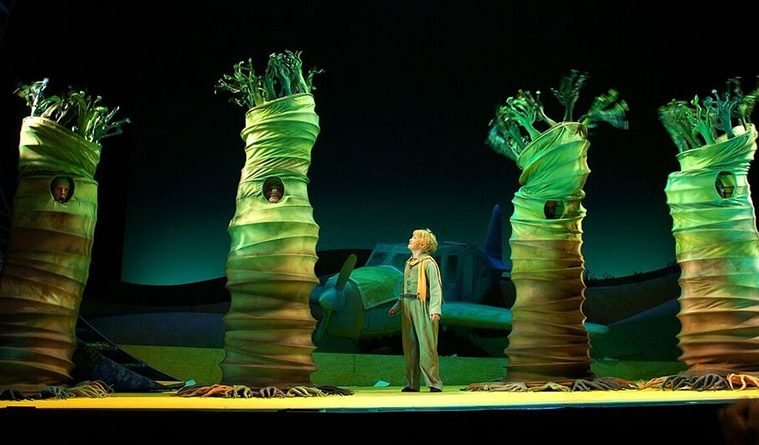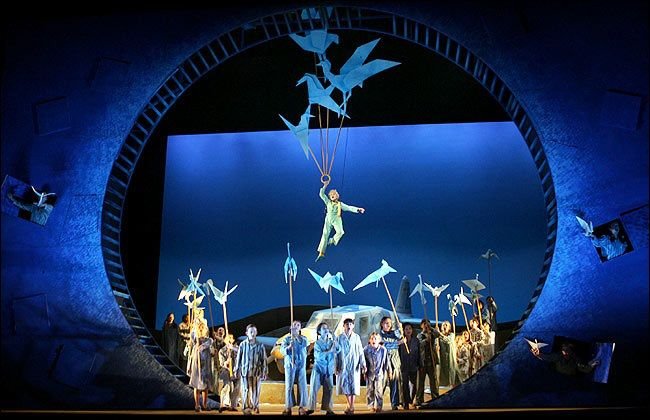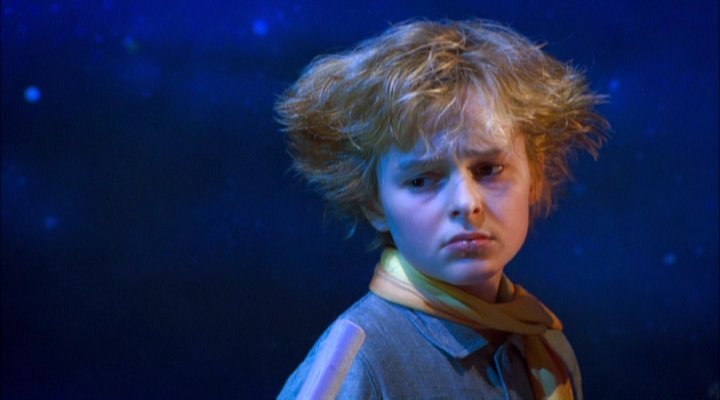This is a review of the English composer Rachel Portman’s opera, The Little Prince, based on Antoine de Saint Exupéry’s much beloved novel. The libretto by Nicholas Wright is adapted from Richard Howard's English translation of the book.
The opera’s plot is a simplified condensation of the book. It is told by the Pilot who crashes his plane into the Sahara Desert during a storm and is startled out of his gloomy mood by The Little Prince, a little alien kid who insists on being drawn a picture of a sheep. Pleasantly intrigued by the boy who reminds him of his younger self, the Pilot becomes fast friend with the Prince and revels in listening to the fascinating stories of his pint-size planet (actually Asteroid B612), which is being threatened by the aggressive baobab sprouts... Hence the need for the young man to return home with a sheep to happily snack on the pesty weeds, hopefully without also eating the beautiful Rose that the Prince loves. The young boy's quest for a baobab sprout-eating sheep takes him to many different planets filled with grown ups who do strange things. I won't include the ending, but then those who have read the book would realize that it is really a parable that can trigger some good philosophical exploration.
Rachel Portman is a well established film composer, winning the Oscar for her score for Emma, and is also responsible for the music of films such as Beloved, The Cider House Rules, Benny & June, Chocolat, etc. The Little Prince is her very first operatic score, however, and it is a very good break through into a new musical genre (though the work still sounds very much more like a film score than a bona fide opera).
The orchestration is light (requiring only 26 instruments) and lush, all at the same time. Ms Portman's choice of instruments to go with specific characters is quite interesting, and she sensibly refrains from imposing extreme and unsingable tessitura on her singers (how uncharacteristic for a modern composer!). It is a 'functional’ opera with an abundance of beautiful melodies that serve well in moving the story forward, though the music is not very catchy. I doubt that it will become a staple piece at repertory opera houses, but I hope it will never completely fall out of performance either.
Cast:
Pilot = Teddy Tahu Rhodes (baritone)
Prince = Joseph McManners (boy soprano)
Rose = Mairead Carlin (soprano)
Fox = Leslie Garrett (soprano)
Snake = Tom Handle (tenor)
Lamplighter = Timothy Robinson (tenor)
Drunkard = Aled Jones (tenor)
King = Sir Willard White (bass baritone)
David Charles Abell conducting the BBC Concert Orchestra/ BBC Talents Children’s Chorus
Stage Director = Francesca Zambello
When an opera has a target audience covering such a wide age-group (surely parents won’t let their kids go to see an opera without supervision!), the task of staging it in such a way to appeal to everyone is a tall order. I think Francesca Zambello did a very fine job of making this performance quite appealing to young children without making it too ‘kiddie’ for adults as well... (the same can’t be said of many a staging of Mozart’s The Magic Flute). The scenes of the Prince's many encounters are quite fun to watch with some fantastic use of lighting. All without drawing too much attention away from the singer.
The very good singing cast contains only one big operatic star in Sir Willard White, a luxury cast as the King, who is both regal and charming all at once. The New Zealander baritone Teddy Tahu Rhodes is very engaging as The Pilot. He sensibly resists the temptation to over-sing or to over-act his role. Joseph McManners turns in a very comfortable portrayal of The Prince. I must confess to not being a fan of the boy soprano voice, but young McManners is a very natural actor and copes well with the taxing role.
The whole cast delivers the story very well and are remarkably clear with their English diction (somehow I always have the hardest time understanding sung English in an opera). This makes up somewhat to the lack of subtitle... Only 'somewhat' because I have been listening to opera for quite a while and am used to it. How well the young children you are trying to introduce opera to would fare in that department without the help of subtitle is a question mark to me.
At any rate, this is a very good recording to introduce youngsters to opera with.


